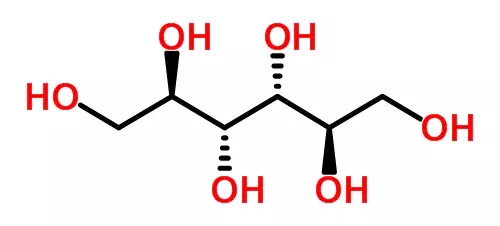CYGNOL MANNITOL
Mannitol is a naturally occurring polyol (sugar alcohol) found in animals and plants. It is a white, odorless, and crystalline powder. Commercially, Mannitol is a product of the hydrogenation of fructose obtained from sugar cane, sugar beets, and maize.
| Cygnus’ Trademark | Cygnol Mannitol |
| Chemical Name | D-Mannitol |
| CAS Number | 69-65-8 |
| EINECS Number | 200-711-8 |
| Structural Formula |

|
| Chemical Formula | C6 H14 O6 |
| Molecular Weight | 182 |
| Compliance | Complies with BP, EP, IP, USP monographs. |
| Product Classification | Sweetening agent; tablet and/or capsule diluent compression agent; bulking agent for freeze‐drying. |
| Regulatory Documents | Regulatory documentation is available upon request, such as:
|
Cygnol Mannitol is a multifunctional excipient used as a compression agent, binder, diluent, filler in various dosage forms such as regular, chewable, fast-dissolving, and effervescent tablets and sweeteners.
Cygnol Mannitol is a versatile tableting excipient thanks to its great chemical stability, low hygroscopicity, solubility, taste-masking, and organoleptic properties. The SD grades are free-flowing granules, thus the choice for the manufacturing of tablets by Direct Compression.
Typical Specifications for Cygnus Mannitol
| ITEMS | SPECIFICATIONS |
|---|---|
| ASSAY | |
| D-Mannitol (USP) (%) | 97.0 – 102.0 |
| D-Mannitol (EP) (%) | 98.0 – 102.0 |
| SPECIFIC TESTS | |
| Melting Range (USP/EP) ( o C) | 164 - 170 |
| Specific Rotation (molybdate) ( o ) | 137 - 145 |
| Specific Rotation (EP) (tetraborate) ( o ) | 23 - 25 |
| Conductivity (USP/EP) (µS/cm) | NMT 20 |
| Loss on Drying (USP) (%) | NMT 0.5 |
| Water (EP) (%) | NMT 0.5 |
| MICROBIAL CONTAMINATION (USP/EP) | |
| Total Aerobic Microorganisms Count (CFU/g) | 1000 |
| Total Yeasts and Moulds Count (CFU/g) | 100 |
| Escherichia coli | Absent |
| Salmonella sp | Absent |
Particle Size Specifications
| Grade | Typical Average |
|---|---|
| 25C | D(0.5) 25 µm |
| 50C | D(0.5) 50 µm |
| 160C | D(0.5) 160 µm |
| SD 100 | D(0.5) 100 µm |
| SD 200 | D(0.5) 200 µm |
| SD 400 | D(0.5) 400 µm |
Package
Packaging material: polyethylene bag inside a fiber or plastic drum.